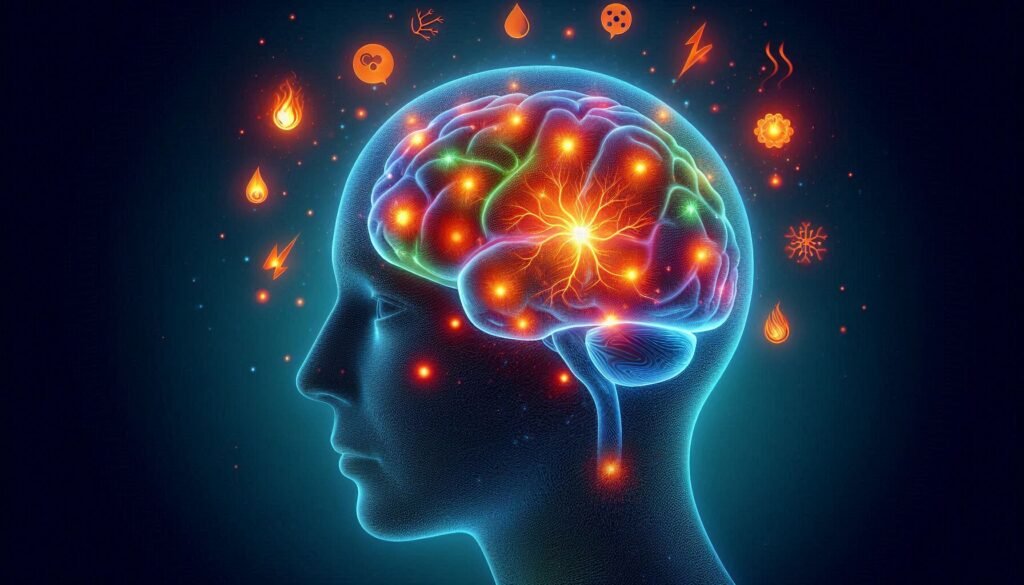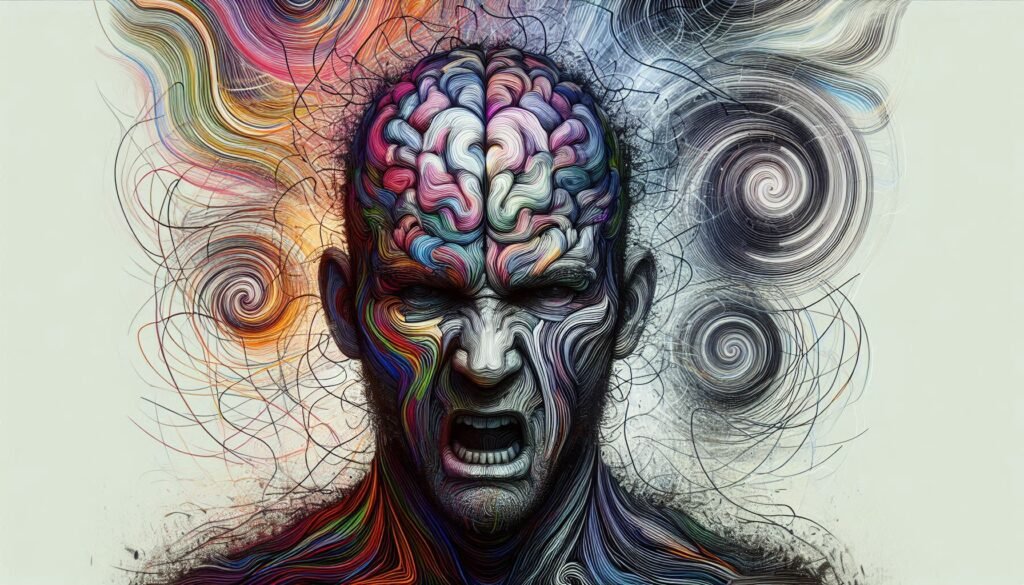Concussions are often seen as a fleeting bump on the head, but their aftermath can be anything but temporary. Neuroinflammation and post-concussion syndrome (PCS) have emerged as critical areas of research in understanding how these injuries affect brain health long-term. When the brain experiences trauma, it initiates an inflammatory response meant to protect and heal itself. However, this very mechanism can turn problematic when inflammation persists beyond its welcome.
As we delve into the complex relationship between neuroinflammation and PCS, we’ll explore what happens during that delicate balance of healing gone awry. Understanding these processes is vital not only for effective diagnosis and treatment but also for paving the way toward better management strategies for those affected by concussions. Whether you’re a medical professional or someone seeking answers about your own experience with concussion recovery, this article will provide valuable insights into mechanisms that may shape future therapies and interventions. Let’s uncover the intricate world of neuroinflammation together!

Understanding the Neuroinflammatory Response to Concussion
When a concussion occurs, the brain undergoes significant stress. This leads to a cascade of biological events, including the activation of immune responses. The neuroinflammatory response is the brain’s way of addressing injury and protecting itself from further damage.
Inflammation serves as a double-edged sword. On one hand, it helps clear away damaged cells and pathogens. On the other hand, if this inflammatory response persists or becomes excessive, it can contribute to secondary injuries and prolonged symptoms associated with post-concussion syndrome.
Key players in this process are specialized glial cells known as microglia and astrocytes. These cells respond to injury by releasing pro-inflammatory cytokines that can exacerbate tissue damage when not adequately regulated.
Understanding how these processes unfold is crucial for developing targeted therapies aimed at mitigating chronic inflammation after concussions. By unraveling the nuances of neuroinflammation, researchers hope to improve treatment strategies for those suffering from PCS.
Acute vs. Chronic Neuroinflammation in Traumatic Brain Injury
Neuroinflammation plays a critical role in the body’s response to traumatic brain injury (TBI). Acute neuroinflammation occurs immediately after the injury, leading to a temporary increase in immune activity. This initial response is essential for clearing cellular debris and protecting against further damage. Various inflammatory markers are activated during this phase, promoting healing.
However, when inflammation persists beyond the acute phase, it transitions into chronic neuroinflammation. This prolonged state can be detrimental, resulting in ongoing neuronal damage and dysfunction. Chronic inflammation often manifests as an imbalance in cytokines and continued activation of glial cells like microglia and astrocytes.
The distinction between acute and chronic neuroinflammation is crucial for understanding post-concussion syndrome (PCS). While short-term responses can aid recovery, long-lasting inflammation may contribute to persistent symptoms such as headaches, fatigue, or cognitive impairments.
Researchers are exploring how these two phases interact within TBI contexts. Understanding their relationship could lead to better treatment approaches targeting specific inflammatory processes linked with PCS.
The Role of Microglia and Astrocytes in Post-Concussion Inflammation
Microglia and astrocytes play crucial roles in the brain’s response to injury, particularly following a concussion. Microglia are the primary immune cells of the central nervous system. They act as first responders to trauma by detecting damage and initiating an inflammatory response. When activated, microglia can release pro-inflammatory cytokines that help combat potential threats.
Astrocytes, on the other hand, provide structural support and maintain homeostasis in the brain. After a concussion, they become reactive and can also produce inflammatory molecules. This reaction is essential for repairing damaged neural tissue but can contribute to prolonged inflammation if not properly regulated.
Chronic activation of both cell types may lead to persistent neuroinflammation associated with post-concussion syndrome. The balance between beneficial repair processes and detrimental inflammation is delicate; when skewed toward chronic activation, symptoms like headaches or cognitive deficits might persist longer than expected.
Research continues to explore how modulating these glial responses could effectively manage post-concussion syndrome symptoms and improve recovery outcomes for affected individuals.
Biomarkers of Neuroinflammation: Diagnostic and Prognostic Value
Biomarkers of neuroinflammation play a crucial role in understanding post-concussion syndrome. They help clinicians assess the extent and severity of brain injury by providing insights into inflammatory processes following concussion. This can lead to more accurate diagnoses.
Common biomarkers include cytokines, chemokines, and glial fibrillary acidic protein (GFAP). Elevated levels of these substances often indicate an ongoing inflammatory response within the central nervous system. Their presence may correlate with the duration and intensity of symptoms experienced by patients after sustaining a concussion.
Using these biomarkers can also aid in predicting patient outcomes. Research suggests that specific patterns of neuroinflammatory markers might differentiate those who will recover quickly from those who face prolonged challenges.
This diagnostic potential makes biomarker analysis an exciting area for further investigation in post-concussion syndrome management. Understanding their prognostic value could guide personalized treatment approaches tailored to individual patient needs.
Impact of Persistent Inflammation on Symptom Duration and Severity
Persistent neuroinflammation plays a significant role in the symptom duration and severity experienced by individuals with post-concussion syndrome. When inflammation lingers, it can exacerbate existing symptoms such as headaches, dizziness, and cognitive impairment. This prolonged state of inflammation disrupts normal brain function.
Studies indicate that persistent neuroinflammatory responses may lead to neuronal damage and impaired synaptic plasticity. As a result, recovery from concussion becomes more complex. The ongoing inflammatory process not only prolongs symptoms but can also increase their intensity over time.
Additionally, chronic inflammation has been linked to mood disorders commonly reported in post-concussion patients. Anxiety and depression can emerge or worsen due to sustained neuroinflammatory activity within the brain’s emotional regulation centers.
Understanding this relationship is crucial for developing effective management strategies for those suffering from post-concussion syndrome. Targeting persistent inflammation could provide new avenues for alleviating symptoms and improving overall quality of life.
The Connection Between Neuroinflammation and Cognitive Deficits
Neuroinflammation plays a significant role in cognitive deficits experienced after a concussion. When the brain sustains an injury, immune cells such as microglia and astrocytes become activated. This activation triggers inflammatory processes that can disrupt normal neural function.
Persistent neuroinflammation may lead to synaptic dysfunction, impairing communication between neurons. As signaling pathways are altered, essential cognitive functions like memory and attention can be affected. Individuals often report difficulties focusing or remembering information following concussive events.
Research has shown that elevated levels of pro-inflammatory cytokines correlate with increased cognitive impairment in post-concussion syndrome patients. These molecules serve as indicators of ongoing inflammation within the brain and highlight its potential impact on mental performance.
Understanding this connection is crucial for developing effective interventions aimed at mitigating cognitive decline after concussions. Addressing neuroinflammation could pave the way for improved recovery strategies tailored to enhance cognitive health and overall quality of life for those affected by trauma.
Anti-Inflammatory Interventions in Post-Concussion Management
Anti-inflammatory interventions are gaining traction in the management of post-concussion syndrome. These strategies aim to mitigate neuroinflammation, which can contribute to prolonged symptoms and cognitive deficits. By targeting inflammation, healthcare professionals hope to enhance recovery outcomes for affected individuals.
Non-steroidal anti-inflammatory drugs (NSAIDs) are commonly used in acute injury settings. They may help reduce pain and inflammation immediately following a concussion. However, their long-term effectiveness in managing persistent symptoms remains under investigation.
Emerging research suggests that corticosteroids might offer benefits as well. These potent anti-inflammatories could potentially address severe cases of neuroinflammation but come with significant side effects that warrant caution.
In addition to pharmaceuticals, lifestyle modifications play a crucial role. Regular exercise and stress reduction techniques have shown promise in reducing inflammatory markers, supporting brain health during recovery from post-concussion syndrome. Such holistic approaches provide an avenue for improving patient outcomes while minimizing reliance on medications.
Nutritional Approaches to Modulating Neuroinflammation
Nutritional strategies play a crucial role in managing neuroinflammation, particularly after a concussion. Certain dietary components can influence the inflammatory response of the brain. For instance, omega-3 fatty acids found in fish and flaxseed have been shown to reduce inflammation and promote healing.
Antioxidants are another key player. Foods rich in antioxidants—like berries, leafy greens, and nuts—can combat oxidative stress that often accompanies neuroinflammation. These foods help protect brain cells from damage while supporting overall cognitive function.
Additionally, a diet low in processed sugars may mitigate inflammatory responses as well. High sugar intake can exacerbate inflammation pathways that worsen symptoms associated with post-concussion syndrome.
Incorporating anti-inflammatory spices such as turmeric and ginger into meals can provide additional benefits. Curcumin, the active compound in turmeric, has demonstrated significant anti-inflammatory properties by inhibiting pro-inflammatory cytokines involved in the neuroinflammatory process.
The Potential Role of Neuroinflammation in Neurodegenerative Risks
Neuroinflammation is increasingly recognized as a key player in the development of neurodegenerative diseases. Following a concussion, the brain’s inflammatory response can persist long after the initial injury. This chronic inflammation may set the stage for conditions like Alzheimer’s, Parkinson’s, and multiple sclerosis.
Microglia and astrocytes, two types of glial cells, remain activated during prolonged neuroinflammation. Their continued presence contributes to neuronal damage and disrupts cellular signaling pathways essential for cognitive function. As these cells release pro-inflammatory cytokines, they further exacerbate neuronal stress.
Research indicates that individuals with a history of concussions exhibit higher levels of specific biomarkers associated with neurodegeneration. This relationship suggests that post-concussion neuroinflammation might not only influence recovery but could also elevate long-term risks for developing neurological disorders.
Understanding this connection raises important questions about monitoring at-risk populations. Targeting neuroinflammatory processes early on could offer innovative avenues for prevention strategies against future cognitive decline.
Future Directions in Neuroinflammation-Targeted Therapies
As research into neuroinflammation and post-concussion syndrome continues to evolve, the potential for targeted therapies offers hope for those affected by traumatic brain injuries. Scientists are investigating various strategies that aim to modulate the neuroinflammatory response effectively. This includes developing medications that precisely inhibit specific inflammatory pathways or enhance protective mechanisms in the brain.
Gene therapy is emerging as a promising area of study, potentially allowing for direct intervention at a molecular level. Additionally, advancements in biomarker identification may lead to personalized treatment plans based on an individual’s unique inflammatory profile following concussion.
Clinical trials focused on drugs with anti-inflammatory properties are gaining traction. These can offer new avenues of relief from persistent symptoms associated with post-concussion syndrome. Furthermore, integrating neuroprotective agents could mitigate damage during acute injury phases and support recovery.
Researchers also emphasize the role of lifestyle interventions alongside pharmacological approaches. Continuous exploration into dietary supplements, exercise regimens, and mindfulness practices illustrates a comprehensive approach towards managing neuroinflammation.
The future holds significant promise in understanding how we can leverage knowledge about neuroinflammation in treating post-concussion syndrome more effectively and improving patient outcomes across diverse populations affected by these conditions.


